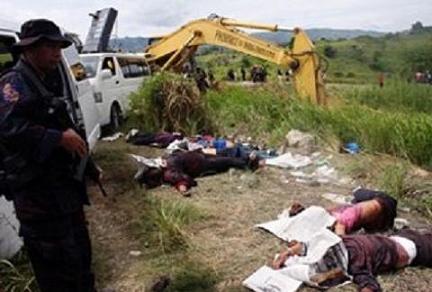Mindboggling, troubling offers for Maguindanao massacre victims
- Details
- Blog Content
- Hits: 5303

There are a number of disturbing things in the aborted settlement between the Ampatuans and the relatives of the 14 victims of the Nov 23, 2009 massacre that was considered the deadliest day for journalists (32 of the 58 victims were members of media).
It was aborted because the negotiator, identified in the article of Mylah Reyes-Roque for VERA Files a Jun Chan was killed in an ambush in General Santos city last March 25. The death of Chan underscores the chilling reality that four years after massacre, the killing has not stopped.
A month before, Chan met with relatives of the victims at least twice in a mosque in General Santos with a mindboggling offer: P50 million for each of the victim in exchange for their withdrawing the case against the Ampatuans. The offer raises another troubling aspect: the Ampatuans are still in possession of huge amount of money not covered by the government freeze on their assets. (The Court of Appeals has ordered a freeze on Ampatuans assets upon the request of the families of the victims. There’s a pending forfeiture petition by the Anti-Money Laundering Council. AMLAC is opposing the motion of the victims’ families to intervene in the forfeiture case.)
The VERA Files article said in the first meeting, families of the victims were asked by Chan, who was accompanied by someone addressed as “Prof”, to sign a document authorizing him negotiate a financial settlement on their behalf in return for 15 percent of the amount.
“We said we would not entertain any offer lower than P50 million, and the emissary said he would talk to his principal,” according to the source.
In the second meeting, Chan told the heirs that his principal was amenable to the amount but asked for two affidavits in return, the source said.
One would be an affidavit of desistance. The other would be an affidavit stating that then gubernatorial candidate Esmael “Toto” Mangudadatu had promised each journalist P30,000 as payment for accompanying his wife Genalyn to the Commission on Elections office in Shariff Aguak to file his certificate of candidacy (COC).
“Akala namin nung una, affidavit of desistance lang OK na, pero sabi nila wala na daw magiging epekto yun sa kaso dahil pwede pa ding mag-prosecute ang gobyerno kahit bumitaw kami (We initially thought that they just wanted an affidavit of desistance, which was all right with us. But they said this would have no effect on the case because government can still prosecute the case),” the source said.
The heirs were asked to state in their affidavit that Mangudadatu promised to pay the victims P5,000 as downpayment and the balance of P25,000 after the COC had been filed, the source added.
Said the source: “Gusto nila na idiin si Toto, na alam nya na ipinapain nya ang buhay ng mga media para makapag-file siya ng COC (They wanted to implicate Mangudadatu by showing that he knew he was putting the journalists’ lives in danger).”
The source also said Chan repeatedly warned them “not to talk to anybody about the negotiations for our own safety.” Hence their silence when he was killed a month later.
Harry Roque, who is counsel for 17 of the victims, four of whom were part of the 14 who agreed to a settlement, said even if Chan didn’t get killed the signed settlement will not be recognized by the court.
“They cannot settle a murder case, especially now that they have already submitted their respective testimonies before the court,” he said.
But what is troubling is the desperation of families of the victims. Roque said “Thus far, it’s been almost 4 years and there is still no end in sight to the criminal prosecution of the Ampatuans. In fact, the Philippine government took almost 4 years just to file the information for the 58th victim, Reynaldo Momay. This should give us a clue on how long the criminal proceedings will take.”
Sen. Joker Arroyo once quipped that with 190 accused, it would take 200 years for the cases to be decided.
Roque scored the government for failure to extend support to the victims beyond lip service. Citing views of the United Nations Human Rights Committee, he said the government is obliged to pay the victims “because it is the state itself that breached its obligation to protect and promote the right of the victims to live. This includes not just monetary compensation, but also all that may be required to restore the emotional and psychological well-being of the victims. “
Roque said the Court has not acted on their motion to order government agencies to provide psycho-social support to the victims.
Strangely, Roque said the motion earned him a petition filed by the accused to cite him in contempt allegedly for “prejudging” the merits of the case.”
Roque said “Unless the Philippine government complies with its duty to pay compensation, the victims will continuously be tempted with schemes that may eventually cause a miscarriage of justice.”
Deputy presidential spokesperson Abigail Valte disagreed with Roque on the monetary obligation of the government to the victims. She, however, reiterated the instruction of President Aquino to the prosecutors “to avoid delay in trying the case and to object to dilatory tactics.”
 Visit Ellen's website. Follow her on Twitter @tordesillas.
Visit Ellen's website. Follow her on Twitter @tordesillas.

